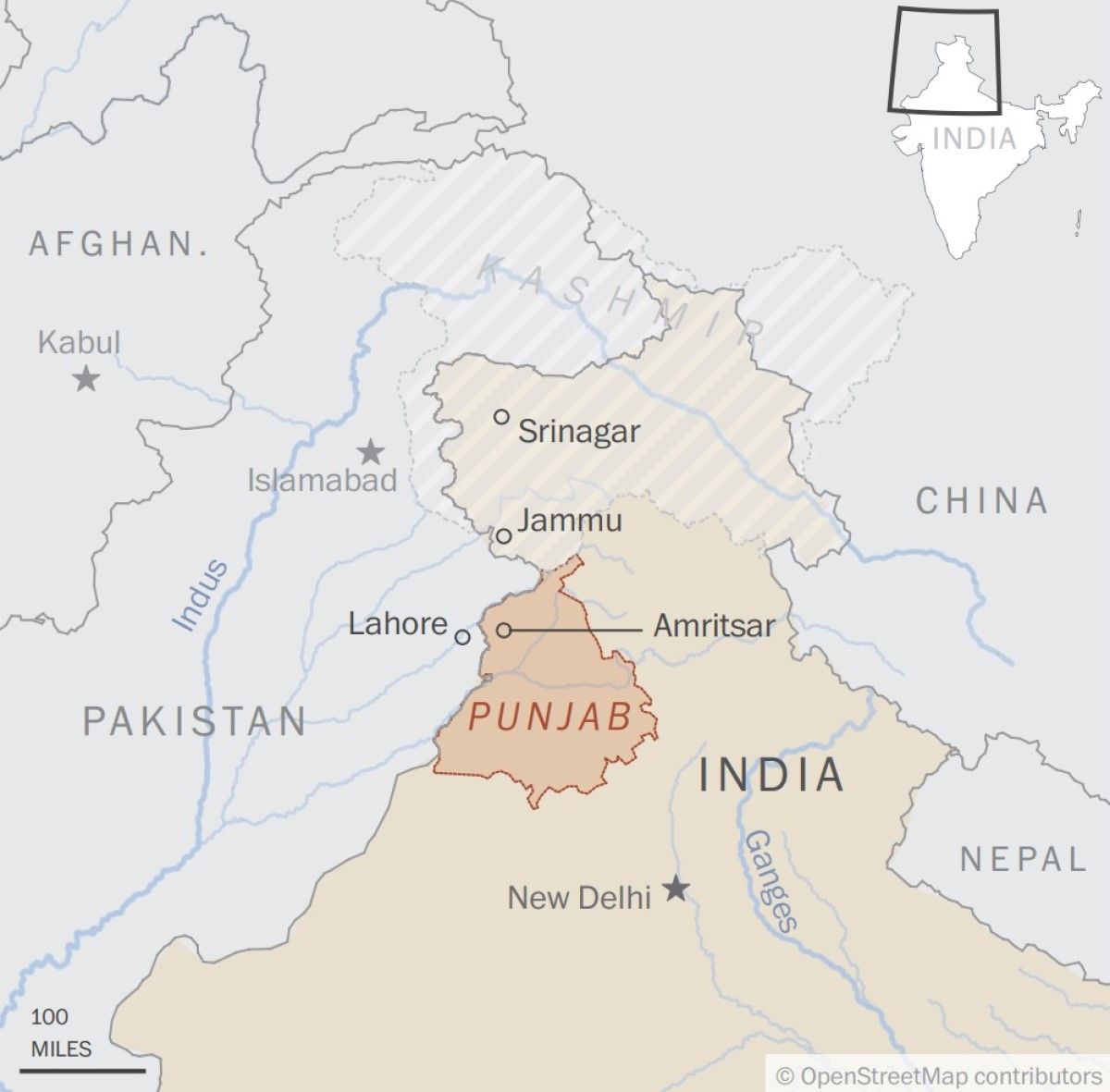
12:31 JST, September 21, 2023
Punjab, the birthplace of the Sikh faith that historically straddled an area now split by the border between Pakistan and India, has suffered decades of political violence and waves of migration – struggles that have now enmeshed Canada, a nation thousands of miles away.
Canada’s place in the middle of tensions surrounding the Khalistan movement, which supports the creation of an independent state in Punjab for members of the Sikh faith, came into sharp focus this week following revelations that India may have been involved in the assassination of a prominent Sikh separatist in British Columbia.
Canadian Prime Minister Justin Trudeau told the country’s Parliament on Monday that there were “credible allegations” that Indian agents were involved in the killing in June of Hardeep Singh Nijjar, a supporter of the Khalistan movement and a leader in the Sikh community. India denies the charges. The allegation follows decades of developments that have further pulled Canada into the dispute.
In the 1900s, the first major wave of Sikhs, the majority of whom were men, moved to Canada, mostly to work as laborers – logging in British Columbia and manufacturing in Ontario, said Sardar Harjeet Singh Grewal, who teaches in the department of classics and religion at the University of Calgary.
Destabilization brought about by partition, the 1947 splitting of India and Pakistan after the end of British colonial rule, further reinforced the emigration of Sikhs from Punjab, he said.
Though Sikhs also moved to Britain, Australia and the United States, they have been particularly drawn to Canada because of “parallel value systems,” he said.
“Sikhs see the most semblance of connection to what Canada represents,” Grewal added, noting that there is now a secondary migration of Sikhs from Britain to Canada. Some of the elements drawing Sikhs to Canada include an emphasis on humanity and equality, he said.
Canada is now home to the largest Sikh population outside India, with about 770,000 people who reported Sikhism as their religion in a 2021 census. While that pales in comparison to the 22 million Sikhs in India, mostly in the northern state of Punjab, Canada has a much smaller population, so that at 2.1 percent, the Sikhs make up a larger portion than in India, where they are just 1.7 percent of the populace.
Neilesh Bose, an associate professor and Canada research chair at the University of Victoria in British Columbia, also noted that while Sikhs are a small minority in India, they make up a large portion of the South Asians in Canada. That has contributed to an outsize prominence of Sikhs in how Canadians perceive South Asia, he said.
Those perceptions faced a jolt in 1985, when a bomb went off on an Air India flight from Canada to India via Britain; the explosion off the coast of Ireland killed the 329 people on board. A Sikh extremist was convicted in connection with the bombing, which came at a time of heightened tensions between the Sikh community and the Indian government. The previous year, heavily armed Indian troops attacked Sikh separatists in Amritsar’s Golden Temple, the holiest shrine in the Sikh religion.
“After that moment, any public discussion about Sikhs, any Sikh politician . . . would always be asked about their potential linkages to any terrorist groups or to Khalistan, which colored how they were understood in a way that didn’t occur before that,” Bose said, referring to the 1985 bombing.
However, not all Sikhs support the separatist movement, and not all supporters of the Khalistan movement believe in the use of extremist tactics to press for a Sikh state.
And though the event has drawn comparisons to the Sept. 11, 2001, terrorist attacks in the United States, the Air India bombing did not set off a dynamic of bigotry toward Sikhs in Canada as extreme as the one inflicted on Muslims (and some Sikhs) in the United States after 9/11, he said.
Today, Sikhs hold a prominent place in Canadian society and politics. The head of the New Democratic Party, Jagmeet Singh, is Sikh. He has been outspoken about the treatment of Sikhs in India and was denied a visa to visit the country in 2013, allegedly because of his public statements.
Trudeau made history in 2015 when he named four Sikhs to his cabinet, more than the two Sikh members of India’s cabinet at the time, which Trudeau reportedly bragged about.
Top Articles in News Services
-

Survey Shows False Election Info Perceived as True
-

Hong Kong Ex-Publisher Jimmy Lai’s Sentence Raises International Outcry as China Defends It
-

Japan’s Nikkei Stock Average Touches 58,000 as Yen, Jgbs Rally on Election Fallout (UPDATE 1)
-

Japan’s Nikkei Stock Average Falls as US-Iran Tensions Unsettle Investors (UPDATE 1)
-

Trump Names Former Federal Reserve Governor Warsh as the Next Fed Chair, Replacing Powell
JN ACCESS RANKING
-

Producer Behind Pop Group XG Arrested for Cocaine Possession
-

Japan PM Takaichi’s Cabinet Resigns en Masse
-

Man Infected with Measles Reportedly Dined at Restaurant in Tokyo Station
-

Israeli Ambassador to Japan Speaks about Japan’s Role in the Reconstruction of Gaza
-

Videos Plagiarized, Reposted with False Subtitles Claiming ‘Ryukyu Belongs to China’; Anti-China False Information Also Posted in Japan






















